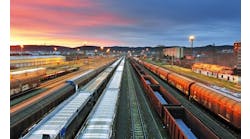Addressing the McGill Worldwide Conference on Current Challenges in International Aviation, Giovanni Bisignani, director general and CEO of the International Air Transport Association (IATA), noted the last time the group had gathered was shortly after the terrorist attacks of September 11, 2001. One of the most visible signs of change since that time is the high cost of fuel. Other factors exaggerate the impact of those costs, which could lead the industry to suffer $3 billion to $4 billion in losses in 2004.
Among four areas Bisignani identified for further action, he said the lack of coordination and harmonization in security that existed three years earlier could no longer be tolerated. Despite highly publicized efforts to improve security, “Governments have failed miserably,” according to Bisignani. “We must fight terrorism, not bureaucracy,” he urged. He put the cost of “this uncoordinated confusion” at $5 billion per year. He once again urged governments to accept their responsibility and pay for national security at the same time he urged the industry to increase the effectiveness of security measures with greater coordination.
“A consequence of not solving the security problem is insurance,” he continued. Underwriters plan to exclude coverage for dirty bombs, electromagnetic pulse devices, and biochemical materials, he said. The urgent need for a stable solution is obvious, said Bisignani, pointing out airlines cannot face this risk exposure alone and governments can’t afford for the airlines to stop flying. He urged governments to follow the lead of Canada and the U.S. and provide individual or collective guarantees to cover these deficiencies.
Another fundamental change Bisignani called for is liberalization. He called the failure of the U.S.-E.U. talks on open aviation a “great lost opportunity.”
Highlighting the fourth area for reform, Bisignani said, “The value chain is broken.” Many airports and air navigation service providers continue “a happy monopoly life” based on cost-plus pricing, he noted. He called the airports’ approach to passing through costs in the form of landing fees out of touch with reality. “The airport gave us the bill for a Versailles with boarding bridges. Since 1998 landing fees increased 208%. Over the same period airline passenger yields declined by about 9%.” He said the airlines could no longer pay for the inefficiencies of service providers (airports and ground services).
He ended his call for action on a positive note saying passenger traffic is 8% above 2000 levels in the first half of the year and cargo is up 15% over the same period.

